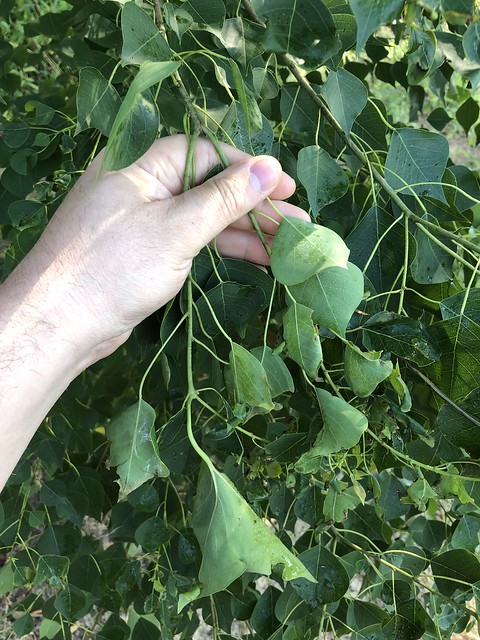Invasive plant and tree identifiers needed
By Lon Tegels
U of A System Division of Agriculture
Aug. 14, 2019
Fast Facts:
- Arkansas Forest Resource Center seeking volunteers to help track invasive plants & trees throughout the state
- Participants use the iNaturalist mobile app to upload data to sharable database
- Invasives thought to effect a $120 billion economic burden nationally
(308 words)
(Newsrooms: with additional art at https://www.flickr.com/gp/uacescomm/X9W9Dt)
(Download this story in MS Word format here.)
MONTICELLO, Ark. – Are you interested in identifying invasive plant species and trees? Do you want to use technology to document your discoveries? The Arkansas Forest Resources Center, Forest Health Laboratory is seeking help in locating and identifying invasive plants.
University of Arkansas at Monticello Associate Professor Mohammad Bataineh is asking outdoor enthusiasts to locate and make observations of the presence of invasive plant species. The project needs people willing to locate and make observations regarding invasive plant species. If you are willing to help identify, photograph and record information about plant species, then this project is right for you.
Bataineh said, “the project will focus on mapping and monitoring the distribution expansion of invasive populations.” Invasives are those non-native species that result in ecological or economical loss or damage. Invasive species are a growing burden on Arkansas’s and the nation’s economy with a $120 billion a year in economic cost.
Arkansans’ participation and contributions are of great value in protecting Arkansas forests and its resources. All observations will be verified and compiled into a shareable map. By using the iNaturalist app, you can check on how your observations are being used.
How to participate
Participants will need a smartphone with internet access to a free app. If you are interested, please download the iNaturalist free app (iPhone link and Android link) and create an account. Once registered, start logging observations and associate them with project "Invasive Plants of The Natural State" at https://www.inaturalist.org/projects/invasive-plants-of-the-natural-state.
Alternatively, you can email locations and or photos of your observations to foresthealth@uamont.edu, or physically mail it to: Arkansas Forest Resources Center, 110 University Court, Monticello AR 71656.
This work is supported, at least in part, by the USDA National Institute of Food and Agriculture, McIntire-Stennis project 1005987.
For more information, please contact foresthealth@uamont.edu.
To learn about forestry in Arkansas, contact your local Cooperative Extension Service agent or visit the Arkansas Forest Resources Center at http://www.afrc.uamont.edu/default.htm. Follow the Cooperative Extension Service on Twitter at @AR_Extension.
About the College of Forestry, Agriculture and Natural Resources and the Arkansas Forest Resources Center
The College of Forestry, Agriculture and Natural Resources and the Arkansas Forest Resources Center, a University of Arkansas System Center of Excellence, bring together interdisciplinary expertise through a partnership between the University of Arkansas at Monticello and the University of Arkansas System Division of Agriculture.
The College and Center are headquartered at the University of Arkansas at Monticello campus, but their programs range statewide with the mission of developing and delivering teaching, research and extension programs that enhance and ensure the sustainability and productivity of forest-based natural resources and agricultural systems. Academic programs are delivered by the College of Forestry, Agriculture and Natural Resources through the University of Arkansas at Monticello.
Through the University of Arkansas System Division of Agriculture, research is administered by the Arkansas Agricultural Experiment Station, and extension and outreach activities are coordinated by the Arkansas Cooperative Extension Service.
The University of Arkansas at Monticello and the University of Arkansas System Division of Agriculture offer all of their programs and services (including employment) without regard to race, color, sex, national origin, religion, age, disability, marital or veteran status, genetic information, sexual preference, pregnancy or any other legally protected status, and are equal opportunity institutions.
About the Division of Agriculture
The University of Arkansas System Division of Agriculture’s mission is to strengthen agriculture, communities, and families by connecting trusted research to the adoption of best practices. Through the Agricultural Experiment Station and the Cooperative Extension Service, the Division of Agriculture conducts research and extension work within the nation’s historic land grant education system.
The Division of Agriculture is one of 20 entities within the University of Arkansas System. It has offices in all 75 counties in Arkansas and faculty on five system campuses.
Pursuant to 7 CFR § 15.3, the University of Arkansas System Division of Agriculture offers all its Extension and Research programs and services (including employment) without regard to race, color, sex, national origin, religion, age, disability, marital or veteran status, genetic information, sexual preference, pregnancy or any other legally protected status, and is an equal opportunity institution.
# # #
Media Contact: Mary Hightower
Dir. of Communication Services
U of A System Division of Agriculture
Cooperative Extension Service
(501) 671-2126
mhightower@uada.edu
